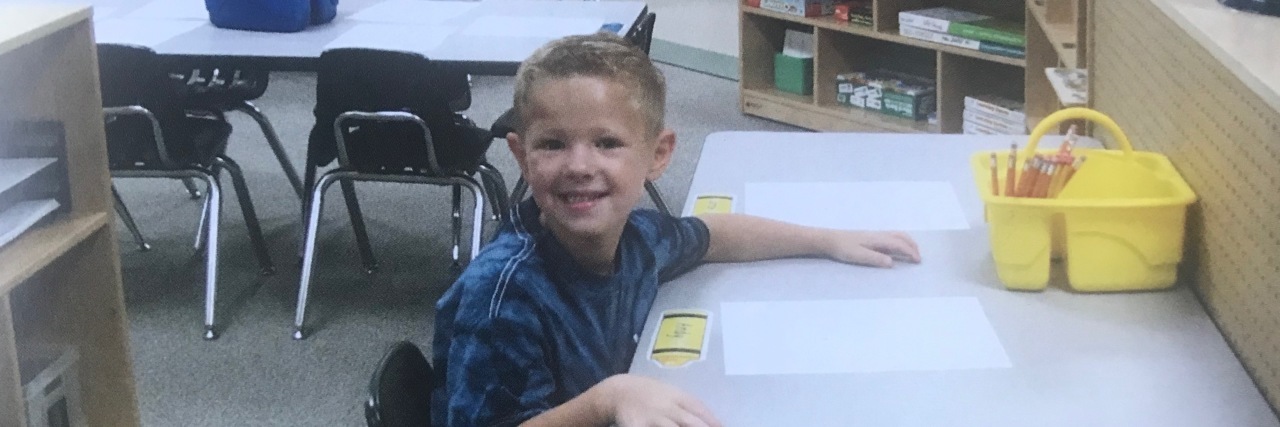I walked into my oldest son, Andrew’s, kindergarten class and my heart sank. The room was brightly colored and beautifully decorated with care, but that wasn’t where my eyes were drawn. There were four tables with four kids each, and a table off to the side with only two kids. You can guess which table my son’s name tag was placed at. It was his first day of kindergarten, and in my mind, he was already an outcast. My temperature began to boil, and I marched over to the teacher to demand he be switched. Before I reached her, someone stepped in front of me and unknowingly saved me from making a horrible mistake. I left without saying a word, and that teacher not only gave my son a wonderful kindergarten year, but later became a strong advocate for my younger daughter with autism when she needed it most.
Whether you carry tissues or confetti to your child’s first day, starting kindergarten can be emotional for any parent. Being mindful of this stress can keep us from doing or saying things that might hinder our child’s experience at school. Here are eight things I learned in my three children’s kindergarten years to help you start your school year off right:
1. Establish open communication with your child’s teacher.
Introduce yourself and share about your child. Do not make any demands at this time. Similar to a friendship, wait until the relationship is established to ask for anything (unless the IEP is not being followed). A positive relationship is key to successfully being heard and getting what you need later.
2. Become an encourager of the teacher.
Find out the teacher’s favorite drink, treat or collection and gift them with these things every once in a while. Write notes of encouragement expressing your gratitude for them teaching your child. Thank them for even the smallest thing they do right with your child. If the teacher feels supported and encouraged by you, this will reflect in their time with your child.
3. Under-react when you see or hear something you don’t like at the school.
If your child is not in danger, and this has nothing to do with their IEP, under-react. Give the issue time to allow your emotions to settle down, then take the time to ask the teacher about what happened in a non-accusatory way. There are often two sides to every story.
4. Look for volunteer opportunities that will get you inside the classroom.
Look for opportunities that will allow you to interact or observe your child’s class as a “volunteer.” Do they need a helper for centers, library or lunch? Can you assist in an art project, help implement a class party or chaperone a field trip? Offer your time to the teacher…they will be grateful for the help. You will learn valuable information about your child’s classroom structure and which kids are potential friend material.
5. Ask for the schedule of your child’s day.
This will help you to ask simple pointed questions that will open up a dialogue with your child about their day.
6. Mentally prepare yourself to be extra patient with your child’s behavior in the first month of school.
Adapting to a new schedule, new classroom, new kids and new expectations can be completely overwhelming for any child. Try to take a step back, give more grace and fewer demands at home than usual while they adjusts.
7. Make a strict plan that you can stick to before and after-school for screen time.
The research is out: too much screen time is not good for kids. Make the rules and be consistent with them, so your child knows exactly what to expect. Maybe require physical exercise before and after screen time or plan a family activity instead. Expect push back from your child at the beginning, but like all things, it will pass if you stay consistent.
8. Take some “me time” at least once a week.
We often care for ourselves last, but we are better parents when we are doing the things that we enjoy. It’s not selfish. It is OK to take a little, so you will have the energy to give. We think there is no extra time in the day, but finding some time for yourself will benefit the whole family.
Soon after school began, my son’s kindergarten teacher re-arranged the tables, and Andrew was no longer at a table for two. He made friends, loved school and the small kindergarten table issue did not affect him in any way. Looking back, I know whoever unknowingly blocked my path to the teacher that morning did me a huge favor. I learned to step back, take a breath and approach the classroom with a more level head. Hopefully, these eight things will help you do that too.

